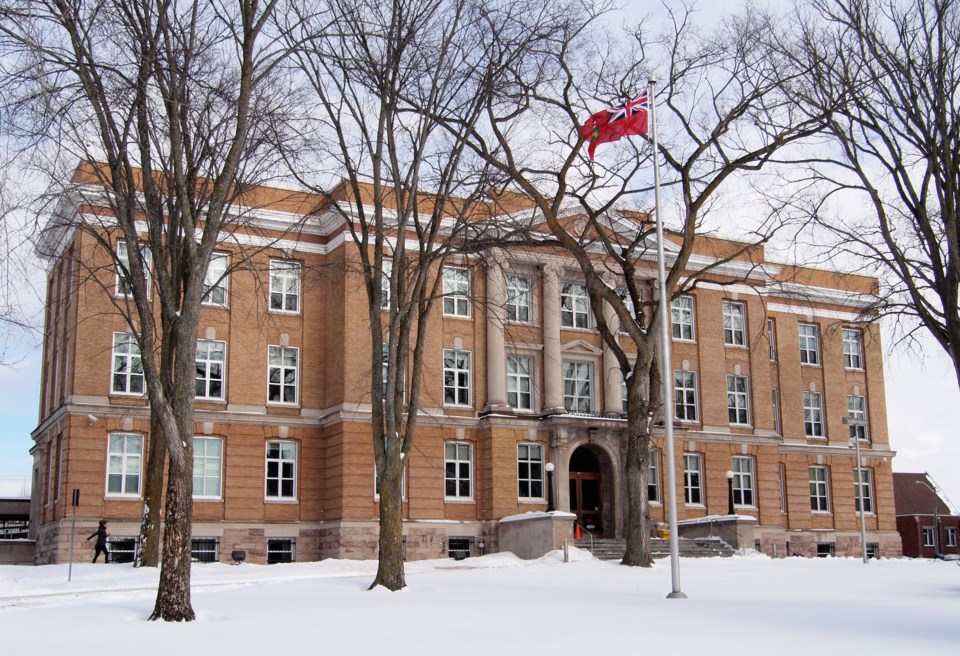Court time has become a scarce commodity for lawyers in Sault Ste. Marie as the COVID-19 pandemic continues to cause a backlog in the courts locally.
And that’s despite a directive issued to Crown prosecutors by Ontario’s Ministry of the Attorney General in October to resolve cases as early as possible in order to reduce the number of cases in the criminal justice system.
Sault Ste. Marie lawyer Kenneth G. Walker says that right now, he believes they’re setting some trial dates in Ontario Superior Court to 2023.
“There’s no question there’s a backlog locally, and it’s the longest backlog that I’ve ever seen in 32 years,” Walker said.
Kenneth Davies, who primarily practises family law locally, says that legal matters such as divorce, custody of children and child support are often pushed to the background in order to give priority to hearing cases involving serious criminal offences.
“It’s almost impossible, if I can use that phrase, to get a hearing, a trial, on a civil case in the Superior Court,” Davies said.
In 2016, the Supreme Court of Canada determined through R. v. Jordan that most trials should finish either 18 or 30 months after a person is charged, depending on the type of trial.
The Jordan decision requires cases in provincial court to be heard within 18 months and those in superior court to be heard within 30, unless the court agrees there were extenuating circumstances.
But Davies says that nowadays, despite the court’s best efforts, a family case heard at the Superior Court can be delayed months beyond those time frames.
“Now it’s up in the air - who knows how long it’s going to take you. It’s hard to get dates. Right now, we’re looking at conference dates in the Superior Court probably in April, and we’re just in November - and that’s basically the first step in all of these cases,” he said.
Walker says the COVID-19 cases at Algoma Treatment and Remand Centre could also pose problems for both lawyers and clients.
“Things like that add to the delay, because people can’t make phone calls because they’re locked down in the institution, because of the lockdown it’s probably difficult to transfer people from one part of the jail to the other,” Walker said.
Early last month, Crown prosecutors were issued directives by the Ministry of the Attorney General aimed at screening out some charges due to COVID-19 in an effort to reduce the case backlog across Ontario.
As one local lawyer explained to SooToday, the courts are kicking certain impaired driving trials to the curb rather than spending two days arguing it. Basically, if the readings aren’t that high and there are no aggravating factors, the courts will deal with the situation by way of a plea to a careless driving charge under the Highway Traffic Act.
“You see more things that are being resolved, but there’s still a huge backlog,” he said.
When that same lawyer recently scheduled a trial for a case to be heard by the Ontario Court of Justice, the first available days for a two-day trial were in June 2022.
Now, Ontario plans to spend more than $72 million over two years to tackle the backlog in the courts, which the province says has reached tens of thousands of cases over the course of the COVID-19 pandemic.
Attorney General Doug Downey says that a portion of the funding will help pay for more than 340 court employees to help boost trial capacity and reduce the number of cases coming into the justice system, as well as speed up cases already in the system.
"I don't think the justice system has seen this kind of investment in my living memory, quite frankly," Downey said. "And I think it's a real opportunity to hold the right people accountable and to move other people through the system, if that's what the right outcome should be."
Lawyers locally say the backlog began with the emergency shutdown order issued by the province in March 2020, when all trials at the Sault Ste. Marie Courthouse were quickly abandoned and needed to be rescheduled. There were no in-person trials until July 2020, and all jury trials were put off until just recently.
And the legal community has yet to catch up, despite the courts keeping the system operating during COVID with a lot of hearings taking place virtually.
But Davies says that it still takes more time for lawyers to file their papers and get time in court due to the ongoing backlogs.
“It’s a strain on everybody, but the system is working - but unfortunately though, it’s difficult to get things done,” Davies said.
SooToday has reached out to the Ministry of Attorney General for comment. The Crown Attorney’s office in Sault Ste. Marie declined comment.
- with files from The Canadian Press
